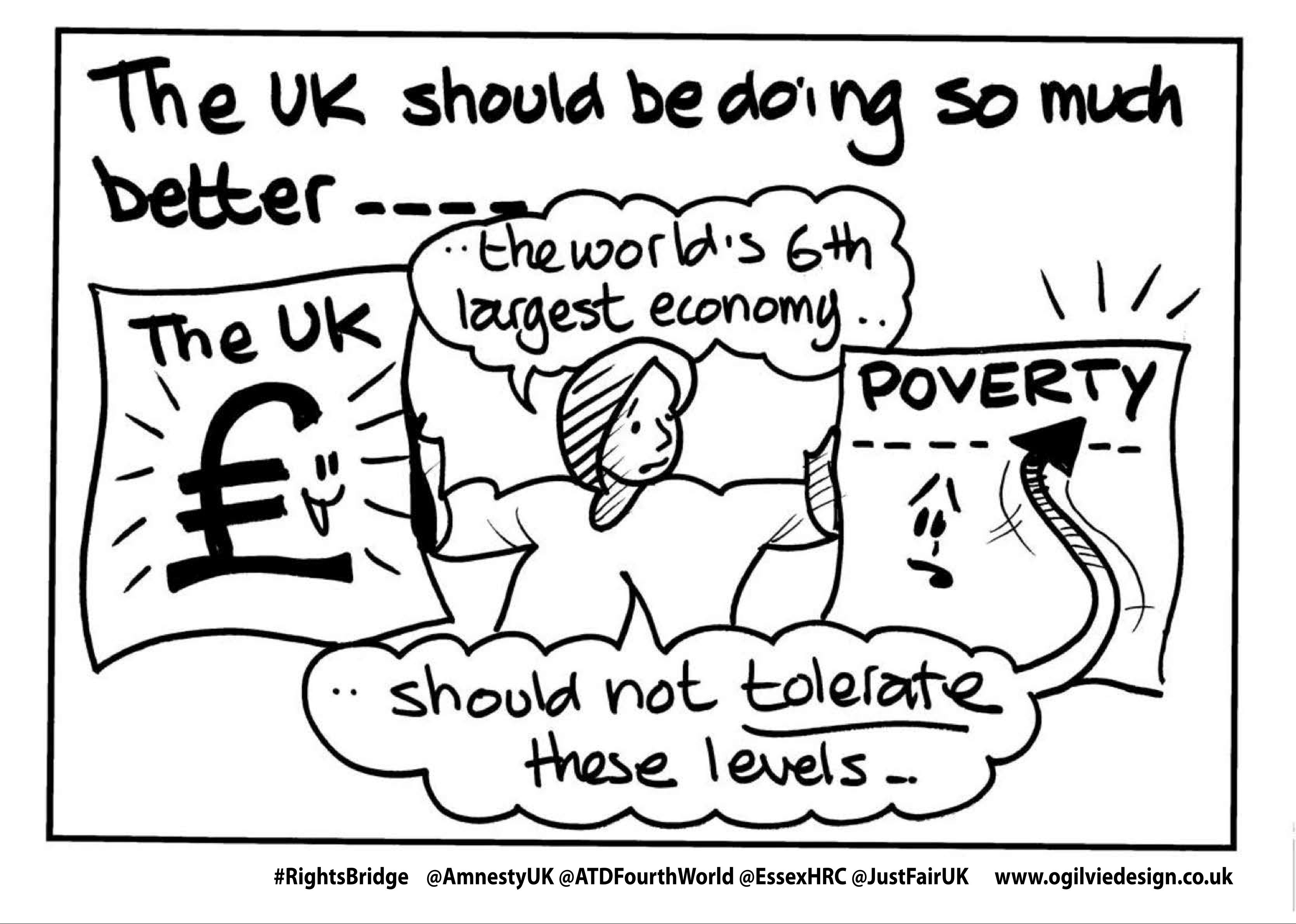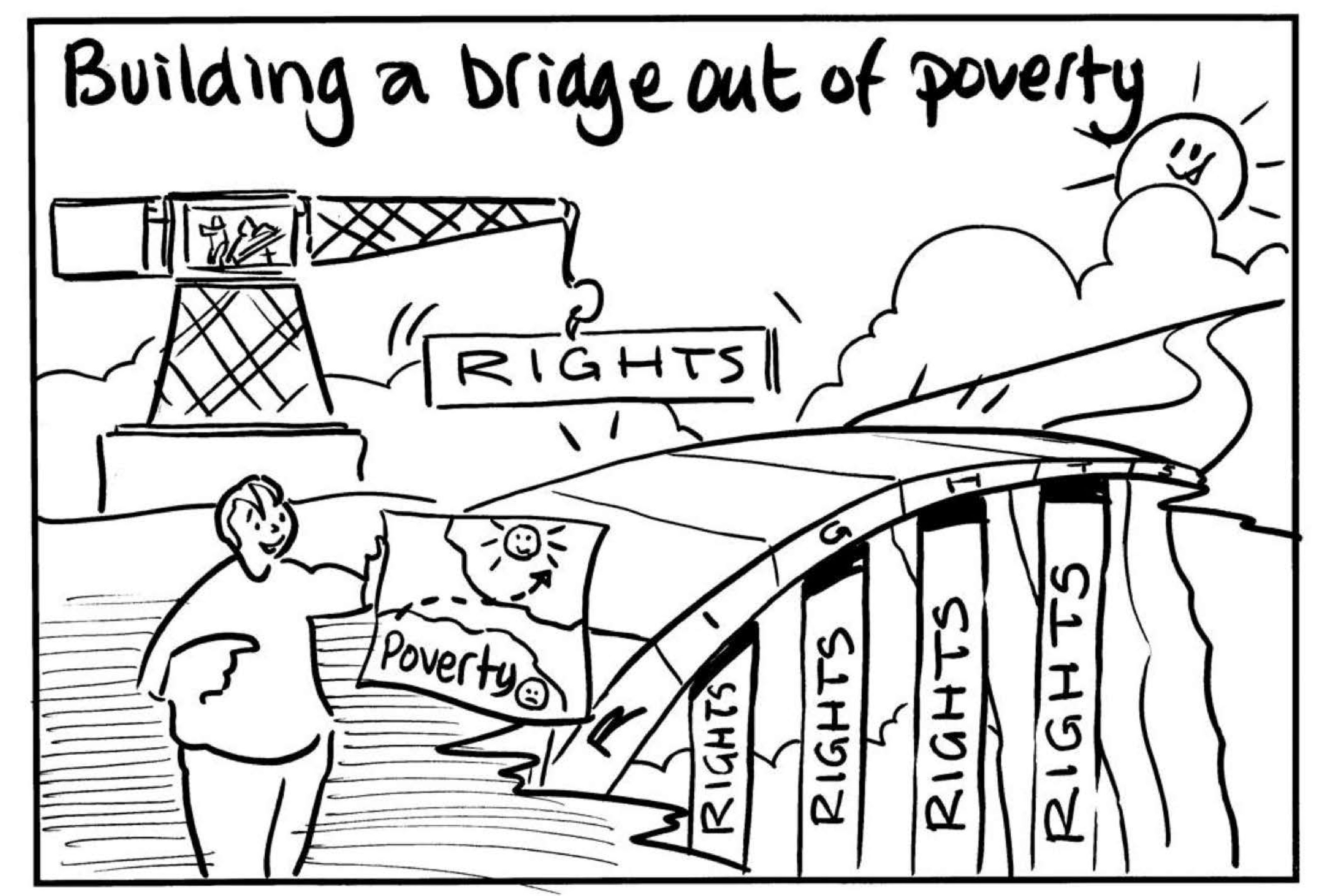What do people need to enjoy everyday life? What are the essential conditions to live a life in dignity, safety and freedom? And what are the rights that belong to all of us? Susanna Hunter-Darch and Dr Koldo Casla share a series of new cartoons exploring these questions, from the perspective of those with lived experience of poverty.
On 21 January, more than 50 people from different parts of the UK gathered online in the first of a series of events to explore questions like these in detail. The events aim to bring together people with lived and learned experiences of poverty, allowing them to learn from each other, and to think through how we can use human rights to build a bridge out of poverty.

The event aimed to bring together people with lived and learnt experiences of poverty.
Even before COVID-19, poverty has been one of the UK’s biggest issues. An unprecedented report from the UN Special Rapporteur on Extreme Poverty and Human Rights in 2018 documented that 14 million people lived in poverty in the UK, with 1.5 million of them in destitution.
Philip Alston’s findings said that cuts to social services were part of the reason so many people were facing destitution, despite such high levels of employment. “The conclusion is both clear and bitter,” he wrote. “Deep cuts to public services do not work and work does not pay for too many people.”

A report from the UN Special Rapporteur condemned the UK’s record.
The dialogue was captured by the brilliant cartoonist Graham Ogilvie, while speakers included activists Patricia Bailey and Nikki Hewson, from ATD Fourth World, Misha Nayak-Oliver, from Just Fair, Vitalis, from RAPAR (Refugee and Asylum Participatory Action Research), and Kait Laughlin, an educator, researcher and anti-poverty campaigner.
Fourteen million people live in poverty, one and a half million of them in destitution, four in ten children are poor, food banks proliferate, homelessness and rough sleeping are on the rise, life expectancy is falling for women born in deprived areas… And all of it despite historically high employment levels. The conclusion is both clear and bitter: Deep cuts to public services do not work and work does not pay for too many people.
Philip Alston
We believe that there is no better way to champion social rights than to hand over a megaphone to the people most affected by inequality, public spending cuts and social exclusion.

The event is the first of a series.
Academics often argue in support of or against the alleged timelessness and universality of human rights. Meanwhile, community groups around the country show that the endurance of human rights depends on what we do with them closer to home in our local communities. Take, for example, York as a ‘Human Rights City’ or Brighton’s proposed ‘Homelessness Bill of Rights’. Both are key examples of localising the language of human rights to become meaningful and relevant.

Human rights can help raise people’s voices.
The experiences of these community groups contribute to connecting international human rights law with local activism in a way that reinforces both spheres, but puts the centre of gravity of human rights action and research at the local level. These cases encourage us to expand and develop a model of human rights advocacy from the ground up, reflecting lived experiences and amplifying local narratives to trigger hope and change.

The root causes of poverty must be addressed with human rights at the forefront.
This was the first of a series of events organised by Just Fair, Amnesty International UK, ATD Fourth World and the Human Rights Centre of the University of Essex to build bridges between people with lived and learned experiences of poverty in the UK.
These organisations are working in partnership with a diverse group of individuals and community-based grass-roots organisations tackling poverty, inequality with some using human rights in their work.
The next event will take place on 10 February and is open to all who would like to attend. As well as contacting the organisations directly, you can follow #RightsBridge on social media. It will be an opportunity to learn from local advocacy led by people with lived experience of poverty and other forms of disadvantage, including a campaign for the right to work in Belfast, for refugee rights in Manchester, the right to food in Wales, the socioeconomic duty in Teesside, and a regional effort to address the digital divide around the North East, among others.





